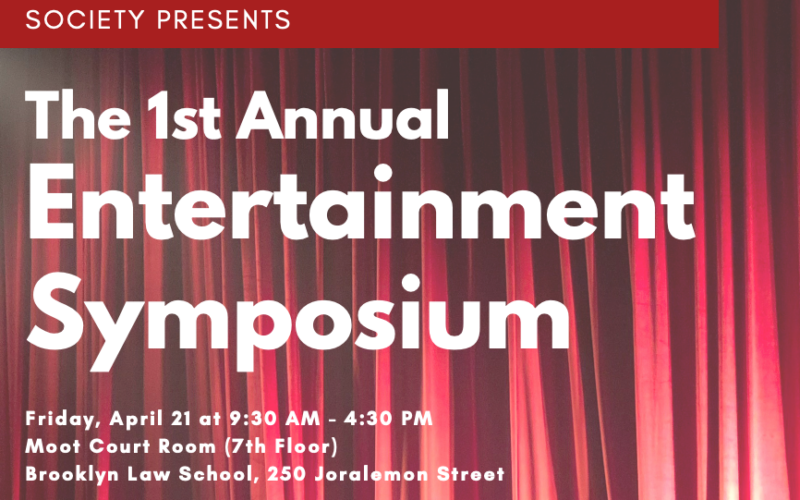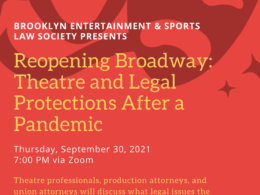On Friday, April 21 the Brooklyn Entertainment and Sports Law Society (BESLS) hosted the inaugural Brooklyn Law Entertainment Law Symposium. The Symposium theme was “Contemporary Legal Issues in the Entertainment Industry” and had many students, faculty, practitioners, family, and friends in attendance – BESLS is already excited for next year!
The first panel of the day, “The Road to Impasse: Why Hollywood is Bracing for a Possible WGA Strike and Looking Forward,” provided an extremely timely discussion of the potential impending Writer’s Guild of America (WGA) strike. Eriq Gardner (Founding Partner and National Correspondent for Puck News; Former Legal Editor at Large at the Hollywood Reporter) moderated the panel, and was joined by Lee Goldberg (Counsel at Frankfurt, Kurnit, Klein, & Selz PC), Emily Herrell (Manager and Owner of Like-Minded Management), and Brooklyn Law alum Michael Maizner (Founder and Managing Partner at Maizner & Associates, PLLC).
The panel began with a discussion of the unique nature of a potential writer’s strike. The panelists pointed to the fact that 98% of WGA members approved the strike, which is an unprecedented percentage. Mr. Gardner proceeded by asking the panelists “why now?” The panelists agreed that this potential strike is the product of many years of pent-up frustration that pre-dates the COVID-19 pandemic. Additionally, the panelists noted that the WGA may be feeling particularly emboldened as a result of their successful defeat of the “Big 3” Hollywood talent agencies –WME, CAA, and UTA – and take-down of the “packaging” practice.
The panelists proceeded to discuss the effects of streaming into the entertainment landscape, particularly the instability such technology has introduced into the lives of writers. The panelists discussed the shift away from the classic network television model of 22-episodes per season to the streaming format of 10 episodes per season. The classic network television model provided steady work for a writer and gave them ample time to forge relationships and advance within the writer’s room. In contrast, the streaming model affords less time to writers to forge such relationships, as the new landscape has given rise to the use of “mini rooms.” Mini rooms are mini writer’s rooms where a group of writers may develop ideas for an entire series’ run. Considering the fact that this practice condenses the typical season-long writing process into a finite period of time, it leaves writers little to no room to “ascend the ranks” as they would in other, more traditional settings.
The panelists also highlighted that it is a common practice of these major streaming service providers to conceal their ratings and statistics from the public. The panelists pointed to this as being an issue due to the fact that a lot of writers obtain their key financial benefits on the “back-end.” In contrast to an “up-front” payment, which typically consist of profits made either before or upon the beginning of the project, “back-end” payments include profits made after the project is finished, like residuals. In the traditional landscape, these payments were calculated based on Nielsen ratings, which are publicly reported. The fact that streaming services keep their ratings and statistics secret make it extremely difficult to calculate the true amount of compensation a writer should be earning from a project. This often results in writers being inadequately paid for their services.
Mr. Gardner asked the panelists whether the 2007 WGA Strike can provide any insight into what to expect if the WGA proceeds with this strike in the upcoming weeks. The panelists speculated that similar to the fall-out of the 2007 WGA strike, the consuming public likely would see an increased push towards reality television programming but that immediately, there likely would be a noticeable difference in available programming if the strike were to proceed. This is largely due to the fact that in the past decade streaming has emerged as the dominant form of consumption in the U.S. and the content libraries of these streaming services are practically boundless. The panelists did however note that broadcast would likely take an immediate hit, with late-night television programs being the first to reflect the empty writer’s rooms.
The panel concluded with Mr. Gardner asking the panelists whether they believe a strike will occur or not. The panelists agreed that there is far more going on than what meets the eye, and that even the most informed industry insiders are unsure what the outcome will be. Ultimately, we will have to wait and see.
BESLS and everyone in attendance would like to thank our amazing panelists, Ms. Goldberg, Ms. Herrell, Mr. Maizner and moderator Eriq Gardner for an extremely thoughtful and topical conversation about the looming WGA Strike.
Editors Note: After failed negotiations, the WGA strike commenced on May 2, 2023.
Written by: Haley Zenenberg
Haley is a 2024 J.D. Candidate at Brooklyn Law School




